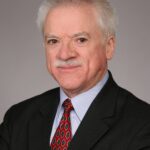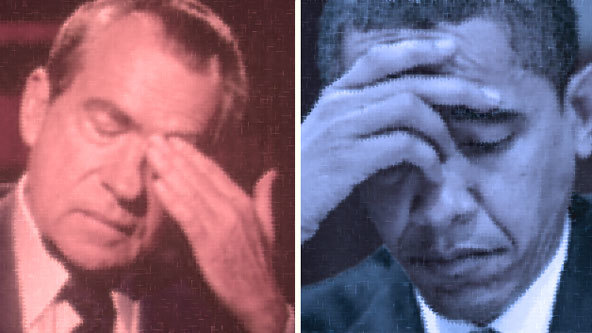No President in modern U. S. history has more self-consciously evoked the images of his predecessors than the incumbent, Barack Obama. When the first-term Senator in 2007 formally announced his candidacy for the Presidency, he chose in his own words to do so in Springfield, Illinois, “in the shadow of the Old State Capitol, where Lincoln once called on a divided house to stand together, where common hopes and common dreams still live … .”
Aided and abetted by Stephen Spielberg’s movie “Lincoln,” starring Daniel Day-Lewis, the President has played up whenever possible his superficial connections and resemblances to President Lincoln – his tall, lanky, stature; his status as an Illinois transplant (born in Kentucky, Lincoln grew up in Indiana; born in Hawaii, Obama grew up in Indonesia); and his former position, like Lincoln, as a member of the Illinois legislature.
Like Lincoln as portrayed in Doris Kearns Goodwin’s “Team of Rivals,” President-Elect Obama brought his chief adversary into his administration in the form of now-former Secretary of State Hillary Clinton, from whom he had wrested the democratic primary nomination that the former First Lady felt was rightfully hers. And, meticulously mimicking Lincoln, he even followed Lincoln’s train route from Philadelphia in January 2009 for his first inauguration – although he could easily have flown there directly instead. But once he arrived in Washington, the Lincoln resemblances abruptly ended.
President Obama’s other favorite predecessor in office is Franklin Delano Roosevelt, with whom the comparison is slightly more apt.
Like Roosevelt, Obama inherited a major economic recession, if not an actual depression, and, like Roosevelt, he both deepened and lengthened it. By misapplying Keynesian economics (Keynes argued merely for temporary deficit spending to “stimulate” economic activity, not constant deficit spending as his acolytes now advocate), President Obama has “stimulated” little more than the bank accounts of favored constituencies, merely redistributing wealth instead of creating it. Nearly five full years after the President’s election to the White House, the American economy remains mired in the doldrums, with one out of seven Americans in the work force unemployed and the same number on food stamps or their equivalent.
But the former Presidents whom Barack Obama most resembles are two the press and the President rarely mention, if at all – Richard Milhous Nixon and James Earl (“Jimmy”) Carter.
Like the one-term Carter, President Obama does not believe in American greatness: he prefers instead to criticize the nation and to diminish its accomplishments, especially abroad. Like Carter, Obama has no apparent grasp of how to deal with a stagnant economy (hint: reducing the regulatory bureaucracy would be a good start) and has been totally feckless abroad. Although luckier than Carter when it comes to the proficiency of U. S. Special Forces (Seal Team Six successfully hunted down bin Laden on Obama’s watch while the attempted rescue of American hostages on Carter’s watch failed miserably), even President Obama must now start to recognize that America’s adversaries, both present and potential, do not respect him as a leader.
Like Carter, President Obama appears clueless when it comes to dealing with his Russian counterpart, and like Carter he has botched things with Iran. Carter kept U. S. athletes from competing in the 1980 Moscow Olympics as an expression of displeasure with the Soviet Union, while Obama cancels talks with Putin in a snit over Edward Snowden; in neither case does Russia show it cares. Carter let Iranians overrun the U. S. Embassy and take Americans hostage, while Obama lets Iran develop nuclear weapons with which to hold the whole world hostage.
Just as Barack Obama most resembles Jimmy Carter on domestic and foreign policy fronts, he most resembles Richard Nixon on the operational front.
As Victor Davis Hanson points out elsewhere, at nearly every turn President Obama lets politics trump both policy and transparency. Like Nixon, Obama has his list of enemies on which, like Nixon, he has sicced his IRS and his Justice Department. (In Nixon’s case, at least, the upper echelons of the IRS resisted the President’s baser instincts; in Obama’s case they were complicit.) Obama’s Attorney General, Eric Holder, is as political as Nixon’s (John Mitchell), if not as corrupt; like Nixon and Mitchell, Obama and Holder believe that if the President does it, then it is not against the law. And, like Nixon, President Obama invoked the name of “national security” to cover up and stonewall evidence of politically inconvenient facts to help ensure his re-election.
In this case, at least, Karl Marx is right: history does indeed repeat itself, first as tragedy, second as farce.





